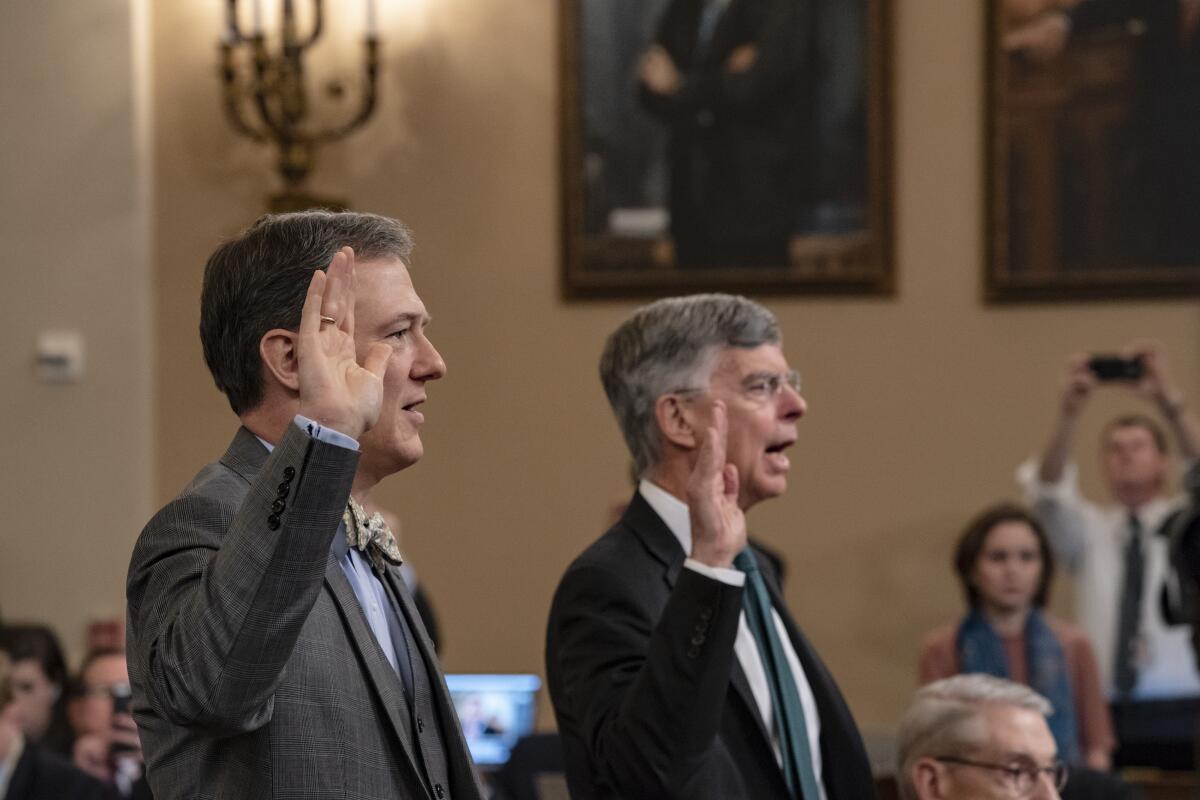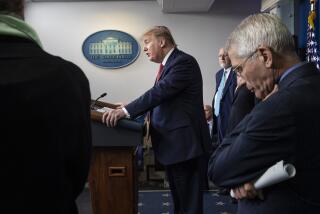Commentary: Already sick of the impeachment hearings? That’s exactly what the GOP wants

- Share via
The impeachment inquiry was only a few hours old when even the hardiest of political junkies began to tune out. They’d read fervently about the closed-door depositions and scanned reams of released transcripts, only to bail when the House hearings arrived in their living rooms and offices, on their TVs and car radios, when the proceedings kicked off Wednesday morning. “I can’t watch this,” said one over the phone. “This is making me sick,” texted another, accompanied by the vomit emoji.
They were hardly alone. Echo chambers across social media reverberated with similar sentiments from both the left and right. Three years of divisive spin, “alternative facts” and partisan thuggery had dulled their senses, dampened their outrage, zapped their zip.
Now they were just — tired. And when it came down to a question of self-preservation versus witnessing history, well, weren’t Clinton and Nixon just impeached?
The collective nausea was no mystery. Americans used to soothing (or stoking) their fears via curated news on their siloed outlet of choice were exposed to the opposition’s argument, unfiltered by Sean Hannity and Rachel Maddow. It was a shock to the system.
But Wednesday’s hearings also represented the fourth formal effort to unseat an American president since the office was established, the first public hearing of the impeachment inquiry into President Trump — and perhaps the only time “constitutional crisis” felt like “business as usual.”
After all, contention, maleficence, finger-pointing and lies are Washington’s main exports, and we’re in a glut economy — still wading through residual angst from the Senate hearings on Brett Kavanaugh’s nomination to the Supreme Court, special counsel Robert S. Mueller III’s downer testimony, every White House news conference since February 2017 and whatever took place over the weekend and the three years before that.
Wednesday looked as if it’d be more of the same when William Taylor, the top U.S. diplomat in Ukraine, and George Kent, a senior State Department official in charge of Ukraine policy, testified before the House Intelligence Committee. The main subject: the alleged quid pro quo in Trump’s call with Ukraine’s President Volodymyr Zelensky in which he asked for a personal favor (dirt on Joe Biden and his son) while withholding military aid.
Though Democrats would turn to the facts, they’d once again prove unwitting masters of the over-complicated argument that leaves most voters in the weeds. The Republicans would wittingly bury those facts, then obfuscate and undermine — a strategy meant to sow doubt and frustration and cause the same voters to tune out.
And that’s exactly what happened. Eventually. But a funny thing happened on the way to fumbling the argument and muddying the waters.
Career diplomat and Vietnam veteran Taylor kicked off the proceedings with a cogent, 41-minute opening statement that contextualized and connected the role of Russia in Ukraine, the plight of Ukrainians and the critical importance of America’s relationship with Ukraine to Trump’s phone call.
He explained that there “appeared to be two channels of U.S. policy-making and implementation, one regular and one highly irregular.” The “irregular” channel included the involvement of Trump’s personal lawyer, Rudolph W. Giuliani, and White House Chief of Staff Mick Mulvaney. And the “irregular” channel, Taylor said, ran “contrary to the goals of long-standing U.S. policy.”
Kent, who oversaw European and Eurasian affairs with deep knowledge of the relationship between the U.S. and Ukraine, explained step by step why the GOP’s assertions that Trump was trying to combat corruption in Ukraine with the now-infamous phone call were not in line with any sort of operation he recognized or witnessed as a long-time diplomat.
The GOP was of course ready with an outrage offensive. Rep. Devin Nunes defended Trump by passing off the inquiry as nothing more than a “theatrical performance.” But then he practically put on a Shakespearean wig and tights when he proclaimed, “This spectacle is doing great damage to our country. … It’s nothing more than an impeachment process in search of a crime.”
Other Republicans on the committee tried to discredit Taylor, indirectly calling him a shill for the Democrats, a low-level statesman with no power, even a liar — the (shoddy) logic being that he’d never met with Trump, and therefore was in no position to talk about the phone call.
Rep. Jim “The Performer” Jordan tried to confuse Taylor, and everyone else, by scrambling the facts and reeling off multiple names of players who overheard or were told of the phone call. “We got six people!” Jordan cried. “I’ve seen church prayer chains that were less confusing than this.” There were incredulous bellows about “outing the whistleblower,” allusions to conspiracy theories involving Hillary Clinton, even the random targeting of evergreen villain Barack Obama.
What phone call?
If all of these contributing factors nonetheless failed to pull the attention away from Trump and down the familiar wormholes, it was thanks to Taylor, who remained a calm, grandfatherly figure in his wire-rim glasses and understated green tie as he was asked over and over again to confirm details from his closed-door testimony. He also dropped a bombshell when he said an aide told him about overhearing Trump press Gordon Sondland, U.S. ambassador to the European Union, about “the investigations” — meaning, into the Bidens — the day after the Zelensky call.
Trump, who was holding a news conference with the Turkish president on Wednesday, said he didn’t want to watch the hearings, but heard they were a “witch hunt,” “a sham,” “a hoax.” Smoke and mirrors would have been a better analogy for the Republican strategy.
But as Taylor and Kent showed, it’s still possible for cooler heads to prevail in the Washington pressure cooker. Our job when testimony picks up again Friday is to stay focused on the signal, not the noise — even if it makes us a little queasy.
More to Read
The complete guide to home viewing
Get Screen Gab for everything about the TV shows and streaming movies everyone’s talking about.
You may occasionally receive promotional content from the Los Angeles Times.







